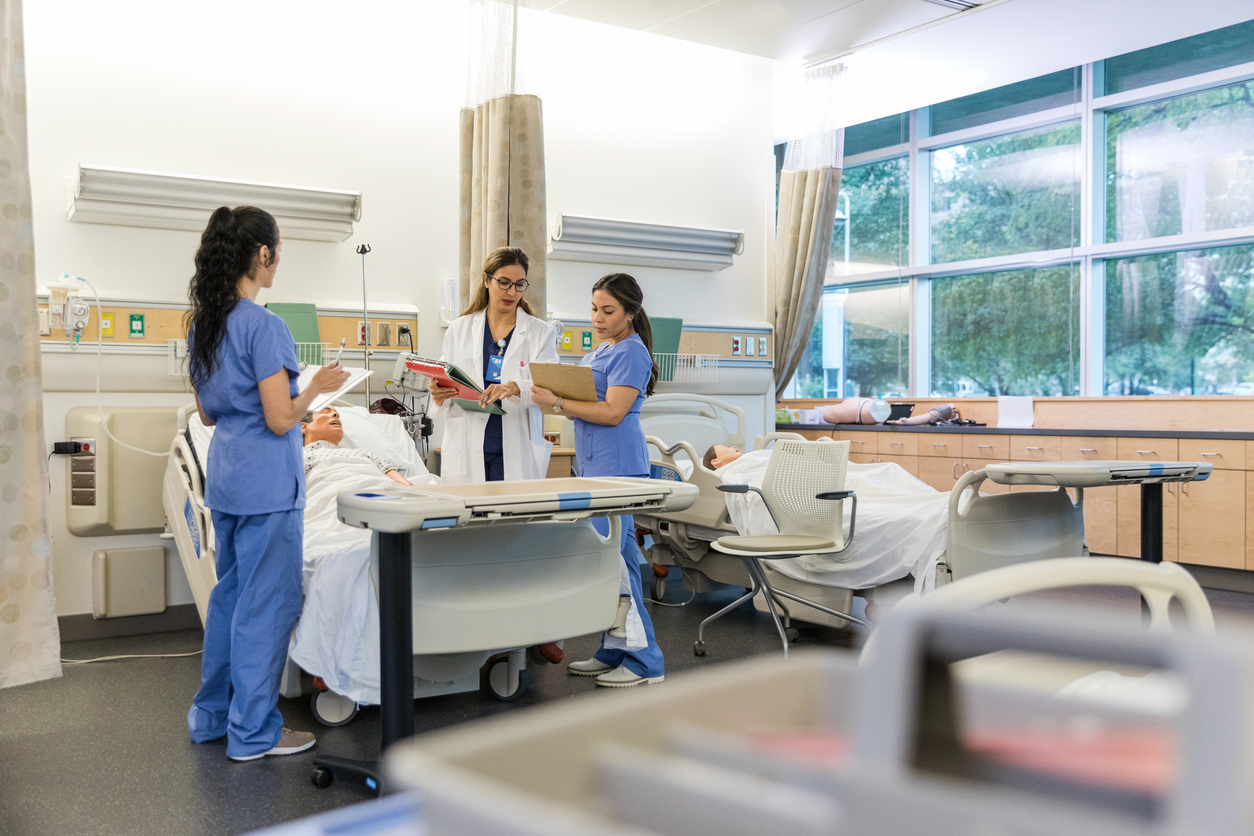How an MSN Can Prepare You For Advanced Nursing Practice
Written by:
University of Tulsa
• Jan 17, 2025

Nursing is an in-demand profession, particularly for advanced practice registered nurses (APRNs), which are growing rapidly because the United States health care system is in need of nurses with specialized training. The U.S. Bureau of Labor Statistics projects that the number of nursing positions that health care professionals with advanced nursing practice can hold will increase by 40 percent between 2023 and 2033, significantly higher than the average of all careers in the United States.
To prepare for advanced nursing practice and obtain one of these roles, nursing students need a master’s degree, such as a Master of Science in Nursing (MSN). This master’s program provides nursing professionals with the skills they need for a specialized career track.
What Is Advanced Nursing Practice?
Advanced nursing practice is a type of nursing in which the registered nurse has completed graduate-level education and training from a nationally accredited nursing program. Additionally, this training can not be general and must focus on a specialization. In addition to graduate-level education, an APRN must be registered as a nurse in their state and pass a national certification exam that measures their specialization-specific skills. These skills allow them to provide a more advanced level of care than general registered nurses (RNs).
What Is an MSN?
An MSN is a Master of Science in Nursing, a type of degree that allows RNs and Bachelor of Science in Nursing (BSN) graduates to hone their skills and advance their careers. This degree also helps these future health care professionals expand their scope of care and focus on more specialized skills.
Key Objectives in an MSN
Key objectives of an MSN program include the following:
-
Attain clinical skills in an area of specialization
-
Master complex skills in the area of specialization
-
Learn to provide direct patient care at a more advanced level
-
Hone soft skills necessary to provide high-quality care
Subject Areas Covered in an MSN
MSNs enable nurses to follow more specialized career paths. Subject areas that an MSN may cover include the following:
-
Leadership: MSNs can prepare nursing leaders, like future directors of nursing, for their roles, including learning skills like team management, cross-discipline communication, and performance measurement.
-
Education: An MSN can set an APRN on a track to becoming a nurse educator, such as a nursing curriculum developer. This area of study focuses on pedagogical theories and strategies, curriculum development tools, and evaluation tools and techniques.
-
Public Health: APRNs can follow a path toward a career in public health, such as working as a Nurse Consultant. In this area of study, a nursing student would learn skills like public health promotion and local and global disease prevention.
-
Analytics: APRNs can also focus on the more analytical side of nursing and aim for a role such as a health care data analyst. When studying analytics, students would learn about data management, project management, and health care information workflow.
How an MSN Can Lead to Advanced Nursing Practice
APRNs can enjoy a wealth of opportunities after obtaining an MSN. Today’s APRNs not only provide direct patient care, but they also conduct crucial research, teach future nurses, shape the future of nursing and health care public policy, and lead health systems. An APRN can work in hospitals, but there are many places that employ these specialized nurses, including government agencies, non-profits, and private corporations.
An MSN allows future APRNs to follow a path that fits the career they want to pursue. They learn more specialized skills, advanced knowledge, and applicable theories that prepare them to thrive in their desired setting.
Careers for Advanced Practice Registered Nurses
While there are many opportunities for APRNs, here are some of the most common career paths advanced nursing practice students pursue:
-
Certified Registered Nurse Anesthetist: A certified registered nurse anesthetist provides anesthetic care to patients during surgical procedures and operations. They can work with the surgical team to safely administer anesthesia, offer emergency services, and suggest pain management tactics.
-
Certified Nurse Midwife: A certified nurse midwife specializes in primary, reproductive, and gynecological health, although their main focus is on pregnancy, birth, and postpartum care. They offer family planning services, help mothers with prenatal and postnatal health and care, and can deliver babies.
-
Clinical Nurse Specialist: Clinical nurse specialists diagnose and treat patients, but they also provide support to nurses who are caring for their own patients. They offer their knowledge and expertise to ensure that patients are receiving the best, most informed care possible.
Becoming an Advanced Practice Registered Nurse with Your MSN Degree
An MSN prepares you to make a difference in your career, from ensuring patients receive the care they need to help stop the spread of infectious diseases. When nursing students embark on the path to advanced nursing practice, they’re training to become leaders, educators, policymakers, treatment specialists, and much more.
The University of Tulsa’s online Master of Science in Nursing (MSN) helps tomorrow’s APRNs learn from today’s nursing leaders and hone their specialized skills to become the health care professionals of tomorrow. In addition to specialized skills and knowledge, these students will also learn how to become well-rounded nursing leaders who practice critical thinking and cross-team communication. They’ll follow specialization tracks that enable them to dive deeper into the areas of study that interest them the most.
Start your future as an APRN with TU.
Recommended Readings
Is an MSN Worth It? Reasons to Pursue This Advanced Degree
10 MSN Specialties: How a Concentration Can Help You Focus Your Degree
10 Nursing Certifications for MSN Graduates
Sources:
American Association of Colleges of Nursing, Master’s Education
American Nurses Association, Advanced Practice Registered Nurse (APRN)
Indeed, “A Guide to MSN Nursing Programs”


